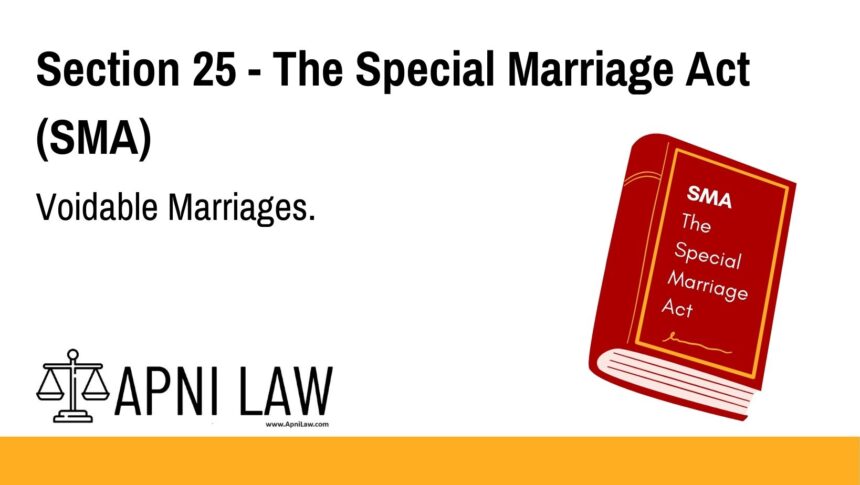Code: Section 25 of the Special Marriage Act, 1954
Any marriage solemnized under this Act shall be voidable and may be annulled by a decree of nullity if,—
(i) the marriage has not been consummated owing to the wilful refusal of the respondent to consummate the marriage; or
(ii) the respondent was at the time of the marriage pregnant by some person other than the petitioner; or
(iii) the consent of either party to the marriage was obtained by coercion or fraud, as defined in the Indian Contract Act, 1872 (9 of 1872):
Provided that, in the case specified in clause (ii), the court shall not grant a decree unless it is satisfied—
(a) that the petitioner was at the time of the marriage ignorant of the facts alleged;
(b) that proceedings were instituted within a year from the date of the marriage; and
(c) that marital intercourse with the consent of the petitioner has not taken place since the discovery by the petitioner of the existence of the grounds for a decree:
Provided further that in the case specified in clause (iii), the court shall not grant a decree if—
(a) proceedings have not been instituted within one year after the coercion had ceased or, as the case may be, the fraud had been discovered; or
(b) the petitioner has with his or her free consent lived with the other party to the marriage as husband and wife after the coercion had ceased or the fraud had been discovered.
Explanation of Section 25 – Voidable Marriages under SMA
Section 25 of the Special Marriage Act, 1954 deals with voidable marriages. Unlike void marriages, a voidable marriage is legally valid until annulled by a court decree. This section gives one party the option to approach the court for annulment under specific conditions.
Grounds for Annulment of a Voidable Marriage
A marriage may be annulled by a decree of nullity on the following grounds:
- Non-consummation due to wilful refusal of the respondent.
- The respondent was pregnant by someone else at the time of marriage.
- Consent was obtained through coercion or fraud, as defined in the Indian Contract Act, 1872.
Conditions and Limitations
- For pregnancy (clause ii):
- The petitioner must have been unaware of the pregnancy at the time of marriage.
- Proceedings must be filed within 1 year of marriage.
- No marital intercourse should have occurred after the discovery.
- For coercion/fraud (clause iii):
- The case must be filed within 1 year after the coercion ends or fraud is discovered.
- The petitioner must not have voluntarily lived with the other party as a spouse after discovery or cessation.
Illustration
Example 1: Refusal to Consummate Marriage
A wife files a petition because her husband refuses to consummate the marriage despite repeated efforts. If the refusal is proven to be wilful, the court may annul the marriage under Section 25(i).
Example 2: Pregnant at Time of Marriage
A husband finds out weeks after the wedding that his wife was already pregnant with another man’s child at the time of marriage. If he proves he was unaware, files within a year, and abstained from intercourse after discovering the fact, he can seek an annulment under Section 25(ii).
Example 3: Fraudulent Consent
A woman is misled about her husband’s identity and coerced into marriage under threats. Once she discovers the fraud and ceases to cohabit, she can move the court under Section 25(iii), as long as she does so within the stipulated time frame.
Common Questions and Answers on Section 25 SMA
1. What is the difference between void and voidable marriage?
A void marriage is invalid from the beginning, while a voidable marriage is valid until annulled by a court under Section 25.
2. Can either party file for annulment under Section 25?
Yes, the party affected by the grounds mentioned (non-consummation, pregnancy, fraud/coercion) can file for annulment.
3. Is there a time limit to file for annulment?
Yes. For pregnancy and fraud/coercion, petitions must be filed within 1 year of discovering the fact or after coercion ends.
4. What happens if the petitioner voluntarily resumes marital life after discovering the ground?
If the petitioner lives with the other party with full consent after discovering the issue (fraud or pregnancy), the right to annulment is forfeited.
5. Is a decree of nullity the same as divorce?
No. A decree of nullity under Section 25 annuls the marriage as though it never legally existed. Divorce ends a valid marriage.
Conclusion
Section 25 of the Special Marriage Act protects individuals who enter into a marriage under false pretenses, coercion, or with incomplete knowledge. It allows such persons to annul the marriage legally through a decree of nullity, ensuring justice and personal freedom.
Need expert guidance on voidable marriage cases or annulment petitions? 👉 Visit ApniLaw for reliable legal insights and support.








